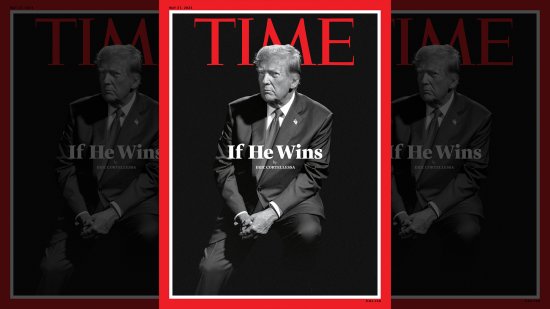
TIME interviewed the former President twice in April, in an effort to better understand what a second Presidency for Trump would look like.
Read our full cover story on Donald Trump here. You can also read the transcript of the interviews here and a full fact check here.
Interviewing political leaders has been a staple of TIME’s journalism for decades, as we report on the most influential people in the world and bring those insights to our readers and viewers. With six months to go until the U.S Presidential election, we want our coverage of this campaign to be of service to our readers, and to help the world and American voters understand what the candidates would do if elected. Today, Donald Trump is in a better position to win the White House than at any point in the previous two campaigns. TIME’s Eric Cortellessa, who covers the Trump campaign, interviewed the former President twice in April to hear from Trump himself what a second term would look like.
[time-brightcove not-tgx=”true”]Read More: How Far Trump Would Go
Much of the coverage of the 2024 race has been about the future of American democracy—and for good reason, given Trump’s refusal to recognize his loss in 2020 and the subsequent attack by his supporters on the Capitol. Trump’s ongoing criminal trial in Manhattan and his upcoming legal battles elsewhere have drawn attention away from specific policy proposals and priorities for Candidate Trump.
But those priorities are ultimately what will define the nation’s politics if he wins. We came away from our interviews with Trump and a dozen of his closest advisers and confidantes with a clear understanding of an agenda that would reshape the presidency and American life. So much about Trump can seem unchanged since he first announced his candidacy. One can miss how much of the situation around him has been transformed.
In the last decade, many of the remaining Republicans in Congress who opposed major pieces of Trump’s agenda have left office to be replaced by Trump loyalists. His campaign, at least today, appears more competent and cohesive than the one that propelled him to power in 2016. While the courts played a significant role in overturning some of Trump’s efforts when he was in the White House, he and Senate Majority Leader Mitch McConnell stocked the judiciary with hundreds of new judges who on the whole are more likely to rule in his favor than those they replaced. Trump tells us he “wouldn’t feel good about” hiring someone for his administration who admits Biden won. The last nine years have witnessed a blossoming of operatives and organizations better positioned to provide intellectual, legal, and financial support for a second Trump term. Similarly, as Trump told us, he thinks he has a better grasp of how to mobilize Washington to enact his vision. While the original members of the Trump Administration may not have been a Team of Rivals, many positions in the Administration as well as leading Trump White House figures originated from regions of the Republican Party other than his own. Trump tells us he won’t be making that mistake again.
Read More: Donald Trump’s Interview With TIME: Read the Transcripts
Trump has sat with TIME journalists regularly for extensive interviews since he announced he was running for President in 2015. We believe these interviews—and deep reporting that places them in historical context—provide valuable guidance for our readers. You’ll find published in TIME today the feature profile that resulted from our two recent interviews with Trump, as well as a full transcript and analysis of his remarks.
TIME Ideas hosts the world's leading voices, providing commentary on events in news, society, and culture. We welcome outside contributions. Opinions expressed do not necessarily reflect the views of TIME editors.